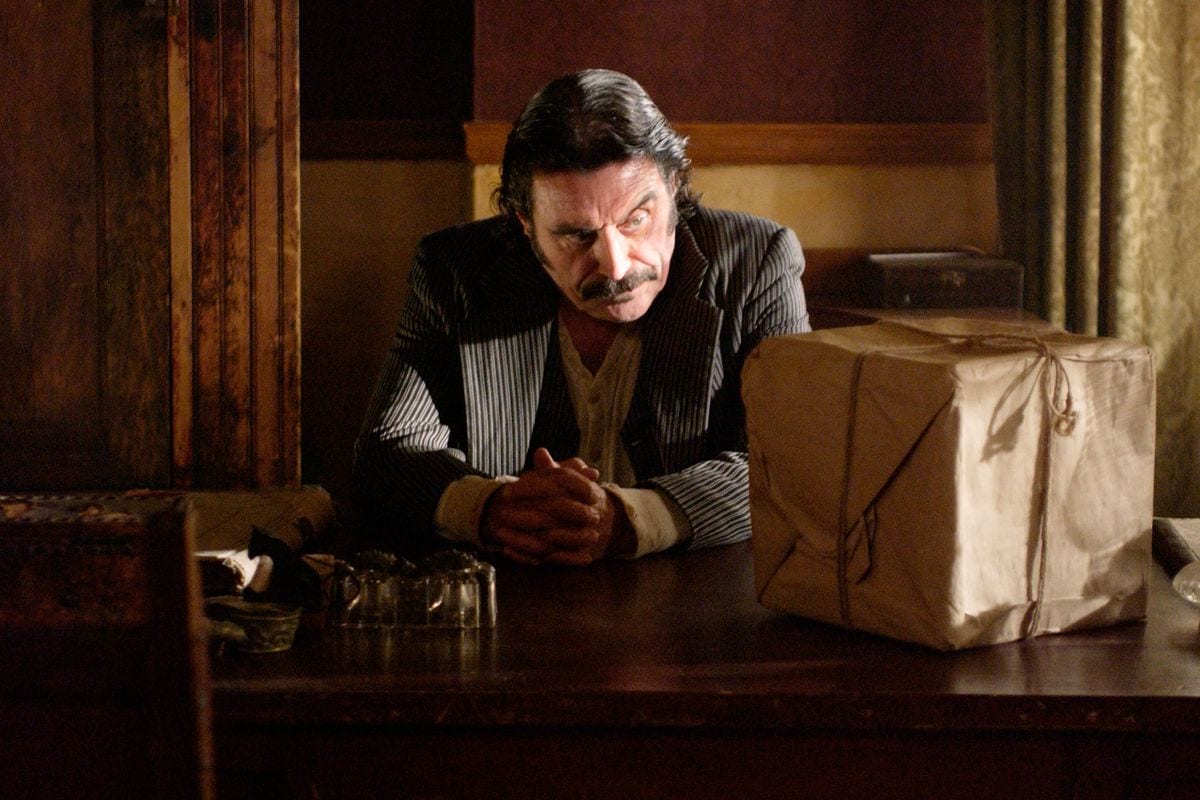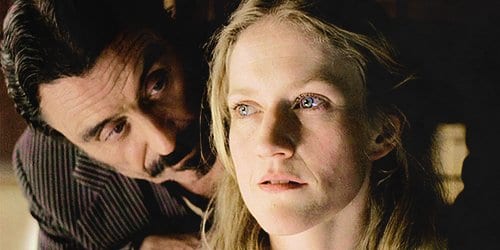In a town like Deadwood, trust can be a complicated thing.
Even among the most forthright of citizens, you find wheeling, dealing, scheming and deceit—people struggling to get by. Life moves quickly here, and violently. No one has time to speak of their own emotional state, and even if they wanted to do, they would be hard pressed to find someone to listen. Deadwood happens, and she waits for no one.
The kinetic thinker does well in a place like Deadwood. The labour never seems to stop, and when one of the characters feels the need to ruminate aloud, multitasking comes in handy. The casual viewer, pausing on Deadwood as s/he flips through the TV channels, might be a bit taken aback to find a character on his knees, delivering a soliloquy worthy of Shakespeare (if Shakespeare had known about modern profanity), as he scrubs away at a bloodstain—the most recent in a long history of murders on his floor. And to whom does he speak as he scrubs? And really…does it matter?
Take EB Farnum, for example. The toady-turned-mayor longs for power, wields none of his own, and his at best a bit of a joke to everyone in the camp. He can’t seem to stop himself from lying to the people with whom he claims alliance, and then when his lies are easily discovered, he does it again. When EB speaks to others, no one is taking him seriously, and he is doing his very best to be polite—he knows he’s playing with the big boys. The vitriol he spews about his resentment of his situation in the camp and in everyone’s esteem is never spoken, save to himself, as he crosses the thoroughfare or scrubs a floor. When EB talks, no one is listening to him, and he knows it. Consequently, he does it alone, out loud, on the off chance that maybe the Almighty is interested in his poetic ramblings. They become a kind of confessional, and it is at these times when we often see the human behind the filthy curtain. But EB isn’t the one I really wanted to talk about.

Al Swearengen is a man who likes to talk. His mind is never still; always looking to the future, occasionally ruminating on the past. He is also a man who wants things done his way. When the bloodstains aren’t being cleaned to his satisfaction from the floor of his joint, he takes matters and scrub brush into his own hands.
My favourite Al-with-bloodstain is in Season 1 Episode 8, “Suffer The Little Children”. In the previous episode, he had gotten angry with Trixie, his favourite whore, and had painfully grabbed her between the legs, to make his point. Now we’re in Episode 8, Trixie is nowhere to be found, and there’s a convenient bloodstain that needs attention. Al thinks out loud as he works, barking at anyone who dares offer help or disturbs his train of thought. His worry and concern that he went too far with the woman he loves is almost heartbreaking…you can practically hear please come back please come back please come back with every swish of the brush. Later, when Trixie does appear, Al has gone to bed and the bloodstain is being worked on by Jewel, the crippled dogsbody. When asked if Al had made her get down on her knees at that late hour, Jewel tells Trixie she got down onto her knees herself. Jewel too was worried about Trixie, and kneeling to scrub away bloodstains and her own fear is the closest she is going to get to a visit to church. The act of scrubbing the bloodstain has become prayer.
Fast forward to the series finale, and there’s another bloodstain to contend with. This time, it is the result of the murder of Jen the whore, who was unlucky enough to look enough like Trixie to take Trixie’s place in the coffin demanded by the camp’s nemesis, George Hearst. A whore takes a shot at Hearst but doesn’t kill him; Hearst will have restitution. Al will do what he must—as long as it doesn’t involve killing Trixie. Despite their ups and downs (not to mention that Al essentially pushed her off into the arms of another man, because Al knew it would be better for her than staying with him), he loves her deeply. In that scene where Hearst comes in with his armed seconds to see the body, we the audience are as tense as Al himself. He grips his knife, ready to take full blame for the deception if Hearst sees through it, and ready to go down swinging. When Trixie sees Jen in the coffin, her entire relationship with Al plays out across her face, and her tears stain the floor where the blood used to be.

It isn’t always bloodstains that loosen Al’s tongue. When we are treated to exposition about Al’s childhood and the abuses he has endured, most times, he is being orally serviced by Dolly, the whore who comes to replace Trixie in his bed. Their relationship is nothing like the one he had with Trixie, and perhaps deliberately so—even the actress who plays Dolly is as physically different from Trixie as a woman could possibly be. Dolly’s job is to provide release for Al, both sexual and verbal—a body, and a sounding board. From her position on her knees, Dolly is regaled with tales of Al’s youth. Despite the indignity (not to mention his constant criticism of her technique), Dolly falls in love with him. He is not cruel to her, the recipient of his venom (metaphorical and otherwise), but more often than not, he is not particularly kind.
When Al has a diatribe that requires an audience of not a single living creature, he turns to the dead. In Season 3, the rest of the camp kick up their heels at an Amateur Night, hosted by the newly arrived theatrical troupe. Though the troupe’s leader is an old friend of Al’s and probably understands him more than many, Al eschews the festivities. That doesn’t mean he doesn’t have a song to sing—the stuffed stag head that hangs over the bar in Al’s saloon is a perfect audience for this. Al’s rendition of “The Unfortunate Rake” is cynical and heartfelt, and captures him perfectly. As Adams says of him, “when he ain’t lying, Al’s the most honourable man you’ll ever meet”.
Just like Tom Hanks had that volleyball to be his best friend, Al has as his closest confidant a severed head—that of an “Indian Chief” who was slain by road agents in the first season. Decapitated, his head was brought back to camp, and now resides in a wooden box that Al keeps in his office. Shut in its small, square coffin, the Chief is privy to all Al’s deepest secrets. When asked, Al is completely candid about the contents of the box. The Chief is the perfect audience for Al—Al doesn’t have to worry about his confidences being taken to the grave, because the Chief is there already.
It is a brilliant storytelling device—by making Al such a kinetic thinker, a man who thinks out loud, the head (or the stag, or the stain, or Dolly) is a surrogate for the audience. And in that equation, for the character, is the audience a substitute for God? These are profane confessions, to be sure, but confessions nonetheless. In Deadwood, trust is complicated. When you find a place where you can safely bare your soul, you don’t discriminate. The best audience for your secrets might be inanimate, deceased, or God himself.

